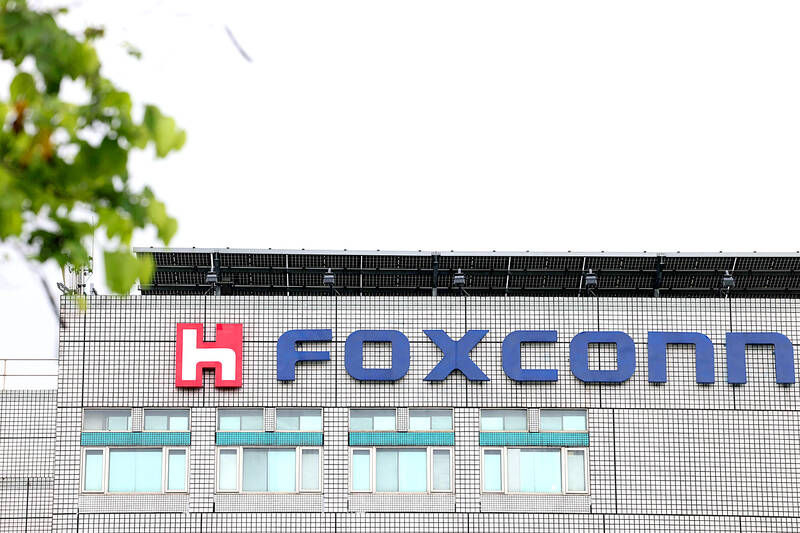Hon Hai Precision Industry Co (鴻海精密) has secured regulatory approval for two investment plans in India and the US worth more than US$2.2 billion, the Department of Investment Review under the Ministry of Economic Affairs said yesterday.
The department said it has approved a plan by Hon Hai, also known as Foxconn Technology Group (富士康科技集團), to spend about US$1.49 billion to raise investments in its subsidiary in Singapore — Foxconn Singapore Pte Ltd.
The Singapore subsidiary will use the funds to invest in another Hon Hai unit called Yuzhan Technology (India) Private Ltd in India, to build a new facility to roll out smartphone components, the department said.

Photo: I-Hwa Cheng, AFP
Amid trade fractions between the US and China, Hon Hai is believed to be diversifying its production out of China with India seen as an ideal destination to make iPhones and iPhone components, and the new investment in Yuzhan Technology (India) is part of its efforts, analysts said.
In addition, Hon Hai has also obtained the greenlight from the ministry to allocate US$735 million from its disposal capital to set up a new company in the US — Project ETA (DE) LLC — which will be in charge of data center module production as well as server assembly businesses.
As Hon Hai expands globally, it has been extending its reach in production to countries and regions such as the US, India, Mexico, Vietnam, and Europe.
Through regionalized manufacturing, Hon Hai has 223 plants and offices in 24 countries around the world with 54 footholds in the Americas, 12 in Europe and 12 in India.
Meanwhile, the ministry said Cathay United Bank Co (國泰世華銀行), a banking arm of Cathay Financial Holding Co (國泰金控), has obtained approval to invest US$160 million in its branch in Ho Chi Minh City for the Vietnamese outlet’s lending business.
In addition, the ministry said AUO Mobility Solution Corp (友達智慧移動), a wholly owned subsidiary of flat panel maker AUO Corp (友達), has been approved to remit US$20 million to invest in its subsidiary in China’s Xiamen, which produces automotive display components, other auto parts and accessories.
As for inbound investments, the ministry said Hong Kong-based Royal Seal Holding Co (合璽醫療器材) has secured the greenlight to invest about NT$97.07 million (US$3.29 million) in its branch in Taiwan for the Taiwanese outlet’s tumor radiological treatment business. Cowealth Medical Holding Co (合富醫療控股), which is listed on the local over-the-counter market, is a major shareholder of Royal Seal.

SETBACK: Apple’s India iPhone push has been disrupted after Foxconn recalled hundreds of Chinese engineers, amid Beijing’s attempts to curb tech transfers Apple Inc assembly partner Hon Hai Precision Industry Co (鴻海精密), also known internationally as Foxconn Technology Group (富士康科技集團), has recalled about 300 Chinese engineers from a factory in India, the latest setback for the iPhone maker’s push to rapidly expand in the country. The extraction of Chinese workers from the factory of Yuzhan Technology (India) Private Ltd, a Hon Hai component unit, in southern Tamil Nadu state, is the second such move in a few months. The company has started flying in Taiwanese engineers to replace staff leaving, people familiar with the matter said, asking not to be named, as the

The prices of gasoline and diesel at domestic fuel stations are to rise NT$0.1 and NT$0.4 per liter this week respectively, after international crude oil prices rose last week, CPC Corp, Taiwan (台灣中油) and Formosa Petrochemical Corp (台塑石化) announced yesterday. Effective today, gasoline prices at CPC and Formosa stations are to rise to NT$27.3, NT$28.8 and NT$30.8 per liter for 92, 95 and 98-octane unleaded gasoline respectively, the companies said in separate statements. The price of premium diesel is to rise to NT$26.2 per liter at CPC stations and NT$26 at Formosa pumps, they said. The announcements came after international crude oil prices

SinoPac Financial Holdings Co (永豐金控) is weighing whether to add a life insurance business to its portfolio, but would tread cautiously after completing three acquisitions in quick succession, president Stanley Chu (朱士廷) said yesterday. “We are carefully considering whether life insurance should play a role in SinoPac’s business map,” Chu told reporters ahead of an earnings conference. “Our priority is to ensure the success of the deals we have already made, even though we are tracking some possible targets.” Local media have reported that Mercuries Life Insurance Co (三商美邦人壽), which is seeking buyers amid financial strains, has invited three financial

CAUTION: Right now, artificial intelligence runs on faith, not productivity and eventually, the risk of a bubble will emerge,’ TIER economist Gordon Sun said Taiwanese manufacturers turned more optimistic last month, ending a five-month streak of declining sentiment as concerns over US tariffs, currency volatility and China’s overcapacity began to ease, the Taiwan Institute of Economic Research (TIER) said yesterday. The manufacturing business confidence index rose 1.17 points from June to 86.8, its first rebound since February. TIER economist Gordon Sun (孫明德) attributed the uptick to fading trade uncertainties, a steadier New Taiwan dollar and reduced competitive pressure from Chinese producers. Taiwan’s semiconductor industry is unlikely to face significant damage from Washington’s ongoing probe into semiconductors, given the US’ reliance on Taiwanese chips to power artificial